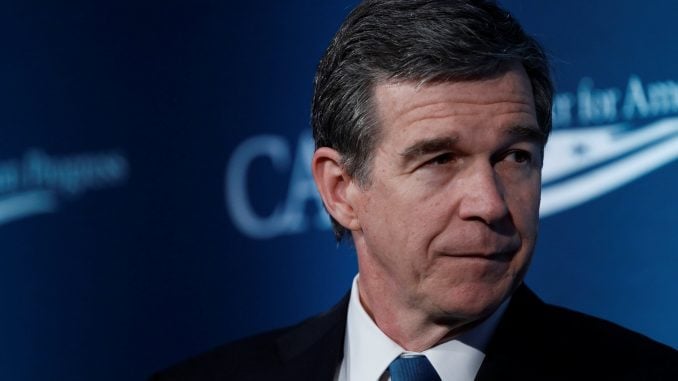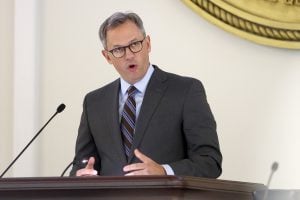
RALEIGH — Democratic Gov. Roy Cooper has a sizeable fundraising lead on his Republican challengers after candidates filed their 2019 Mid-Year fundraising reports with the board of elections.
As of June 30, Cooper has $5.6 million cash on hand after raising $4.8 million since the first of year. Forest, the Republican Lt. Gov., had $1 million in cash at end of the same period after raising $1.3 million. Rep. Holly Grange (R-New Hanover), who recently announced her bid for the GOP nomination, raised $53,000 and had $55,000 in cash on hand.

Forest, who will officially announce his campaign at a Winston-Salem rally on Aug. 17, has been fundraising for what he called an exploratory committee. Cooper has spent $2.4 million so far during the campaign cycle compared to $1.4 million spent by Forest.
The Democratic Governor’s Association touted Cooper’s fundraising haul in a press release that focused on Forest. In the release, the DGA said Forest’s $1.3 million sum was “light years apart from Gov. Roy Cooper.” The group said that Cooper broke his fundraising record for off-year totals from 2015. The statement also predicted a “divisive and expensive primary fight” between Forest and Grange.
“Dan Forest is so out-of-touch with North Carolina he could barely find any supporters to fund his floundering campaign,” said DGA communications director David Turner. “It’s clear whoever stands after this brutal primary fight will emerge with an empty bank account.”
In response to the DGA’s press release, Forest’s campaign spokesman Andrew Dunn said, “Kudos to the governor. He will need every dime of it.”
Beyond the total amounts, the fundraising reports show a stark contract between the fundraising bases of the two candidates. Cooper brought in his $4.8 million from over 14,000 individual donations compared to just 1,890 contributions for Forest. For Cooper, just 10% of his individual donations were for $1,000 or more. Twenty percent of Forest’s donations were for $1,000 or more.
The sources of donations also showed a stark contract between the two candidates. For Cooper, 44% of his individual donations came from donors who listed themselves as either retired or unemployed. Among the unemployed, the average donation was $275 and included 56 “max out” donations of $5,400. Of the unemployed donations to Cooper, 1,250 were for less than $10. Forest’s report showed zero contributions from donors who said they were unemployed, and 199 donors said they were retired.
A former attorney general, Cooper showed particular strength in fundraising from members of the bar with 737 donations coming from persons with an occupation of attorney. Likewise, Cooper did well with educators (292) and professors (250). Forest had 23 donations from teachers and no donors who listed their occupation as professor.
Forest’s report showed that he has strength among several groups against Cooper. Donors who said they were self-employed favored Forest with 210 donations from self-employed people to the Lt. Gov. and only 55 for the governor. Cooper lead Forest in donations from presidents and CEOs, 164 to 115. Forest also bested Cooper in donations from people who listed farmer as their occupation, leading the governor, who is from rural Nash County, 36-15.
Cooper and Forest both took in their donations from predominantly in-state donors. For Forest, just over 1% (24) of his donations came from out-of-state. Cooper took 1,091 donations from out-of-state, representing 7.7% of his donations and 15% of the individual dollars received. New York was Cooper’s top out-of-state source, with the Empire State delivering 259 individual donations, followed by California (142), Florida (59), Maryland (51) and Massachusetts (46).
Both candidates had donors who did not report occupation or employer information. For Cooper, 135 donations exceeded $50 but did not contain industry information with 14 donors for Forest in the same category.



